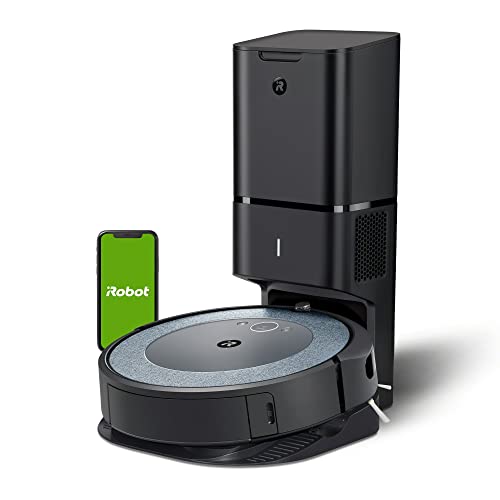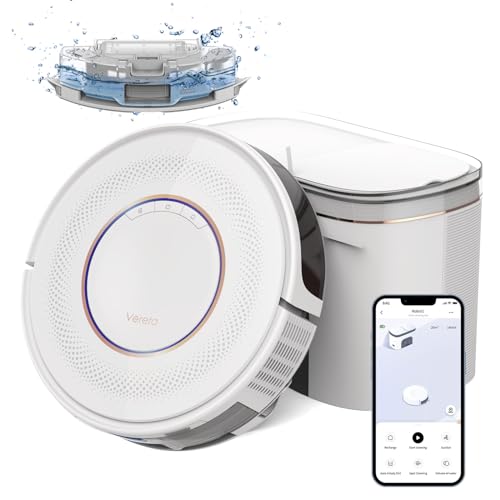The 9 Things Your Parents Taught You About Self Emptying Robot Vacuums
페이지 정보
작성자 Valentin 댓글 0건 조회 109회 작성일 24-06-11 10:11본문
 Self Emptying Robot Vacuums
Self Emptying Robot VacuumsSelf-emptying robot vacuums allow you to clean without touching anything. They don't require you to touch their dustbin or empty it and is perfect for allergy sufferers.
Instead the robot will dump its contents into a bigger base that can hold up to 45 to 60 days worth of dirt. It will then automatically empty itself and return to its dock for charging.
Runtime Increased
Most robot vacuums have an onboard dustbin that must be empty at the end of every cleaning cycle. By incorporating an auto-empty feature, owners to have a hands-off, hassle free experience. While this feature is accessible on a few entry-level models and is a major selling point for many of the top robot vacuums.
Self-emptying robots can be real time saver for busy homeowners. If you're juggling children and work, as well as chores, they do not want the hassle of stopping their robot cleaners to empty the dust bin on board. The added convenience of a self-emptying model means that users can live their lives while maintaining the clean home they crave.
In addition to the primary tasks of a robotic vacuum, some self-emptying models can also mop. They will automatically empty their mopping tanks and then refill it with fresh water in preparation for the next cleaning cycle. They can also wash and dry the pads. This will ensure the device is ready to go for its next cleaning session, and prevent the accumulation of grime within the robot.
iRobot’s latest version of Roomba comes with some amazing features that can assist homeowners to keep their home clean without much effort. Its ingenious Dirt Detection system can identify dirt accumulation and focus cleaning efforts within the area to ensure the entire floor is thoroughly clean. The bot can be used to create virtual zones for keeping out of and schedule multiple clean-ups throughout the day.
The intelligent mapping and navigation abilities of the iRobot Roomba j7+ are another impressive feature. The robot can detect flooring materials, furniture, and other obstacles to make navigation easier. It can be programmed to clean at a particular time and the app map lets homeowners to customize the device.
The Neato BotVac D8 offers a excellent option for those who want to combine the benefits and features of a robotic mop and a robotic vacuum. It can mop and vacuum and its onboard reservoir holds up to 45 days of debris and dirt. It also features an automatic dirt detection sensor as well as an automatic base that can be empty.
Continuous operation
Robot vacuums are great for removing surface debris and dirt from floors that are hard, but they lack the suction power of upright or canister models. They are often unable to clean dirt from carpets rug, rugs and dust near baseboards and thresholds. Even the most efficient robots may get tangled up in socks, toys and cords, making them less efficient than a manual vacuum cleaner.
You'll have to empty your bin often and you don't want to empty it each time you use your robot. This is an issue. The latest self-emptying robotic vacuums come with a docking station which automatically empties and cleans dust bins without needing to do a thing.
This feature can significantly reduce your cleaning time and the amount of dust you have to get rid of, resulting in an environmentally friendly and sustainable device. In addition, it can help you keep your home free of fine dust particles, which are often an important cause of allergy in households.
The top-rated robot vacuums come with a huge dustbin that can hold weeks of dirt until it needs to be empty. You can program the device to empty the trash automatically at pre-determined intervals. This lets you enjoy a hassle-free and hands-free cleaning.
The most advanced models of self emptying robot vacuums also boast the ability to map, which allows them to map out a room or entire house and store the floor plan for future use. This lets the robot avoid repeating areas, while also increasing efficiency and eliminating unnecessary movements. The latest robovacs can use cameras, gyro-, radar- or laser (laser distance sensor or LDS) guided systems to generate an outline of your space.
Apps that allow you to schedule cleaning sessions and configure no-go areas are available for the most well-known self-emptying robotic vacuums. The app lets you monitor and control cleaning results remotely. This is particularly helpful when guests are coming to your home, as it will give you peace of mind knowing that your home is being maintained.
Less downtime
The standard robot vacuums store dirt inside a dust bin, which they need to empty every two cleaning cycles. The self-emptying base eliminates this step, enabling the appliance to run indefinitely between sessions without interruption or the necessity of returning to its charging dock for more power. This reduces downtime between cleaning sessions and allows larger homes to be cleaned from wall-to-wall in a single session.
Some models allow you to program a cleaning routine and also use voice assistants like Alexa or Google Assistant for control. You can define no-go zones, follow the robot's movement and adjust settings like suction power and the amount of water that is distributed to floors. These features may be extra but they can help you get the most out of your robotic vacuum.
Self-emptying robot vacuums also eliminates the need to move and empty the collection canister, which is a plus for those with allergies or who have other chores to do in their home. The base can store months or weeks of dirt and debris. You'll only need to empty the base every 30 to 60 days, the same timeframe you need to change the bin in a regular vacuum.
While many people find a self-emptying robot vacuums self emptying vacuum more convenient, the feature won't work for all. If you're unable to spend more, you could purchase an item with a dustbin built in that will hold weeks worth of dirt. You'll just need to change the bag of disposal paper every so often.
The best self-emptying robot vacuum for pet hair self-emptying robot vacuums will have an excellent capacity to hold dirt as well as continuous operation and the ability to alter settings like suction power. Also, consider a model that has an integrated camera to see what's happening to your floors. Additionally, you should check if the device can be linked to an app that lets you create a cleaning schedule and set no-go zones. You can also monitor the robot's movements and alter other settings. You can identify the top self-emptying robot vacuums by comparing the specifications of the available models and analyzing their performance in independent reviews.
User intervention is minimal
It's only natural that homes robotic helpers can clean themselves as we get used to using our smartphones to calculate pi in a billion different places, activate street lights using electricity, and even purchase things. Self-emptying robots vacuums take this idea one step further by cleaning their own canisters between cleaning sessions.
These machines have dustbins which are usually just four inches tall. They don't have enough room to hold a large dust bin, like one you'd see on a Dyson upright. They also don't have bags and require regular manual emptying since a full dustbin can easily get clogged with hairballs and other debris.
To avoid the hassle of emptying their trash bins manually They transfer all the debris and dirt from their onboard dust bin into an enclosed storage bag at the base of their docking station. These bags are designed to limit dust spreading and stop dust leakage, based on the model.
This hands-free maintenance is not only less annoying, but allows the robot to run for longer between emptying cycles. The robot does not have to go back to the base to empty its collection container before continuing to run. These robots can clean more rooms in a single session due to the shorter downtime.

- 이전글Seven Things I'd Do If I would Begin Again Car ECU Repairs 24.06.11
- 다음글8 Reasons People Laugh About Your Bitcoin 24.06.11
댓글목록
등록된 댓글이 없습니다.